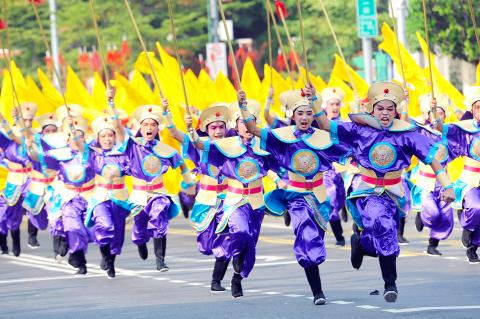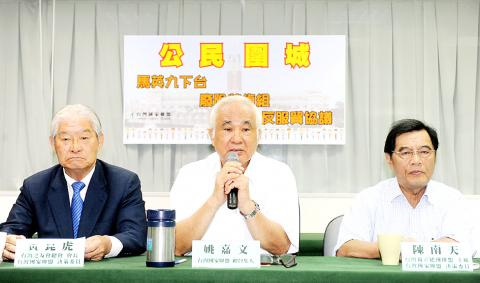Taiwan Nation Alliance convener Yao Chia-wen (姚嘉文) yesterday said that members of the alliance’s pro-localization groups will take part in a major rally against President Ma Ying-jeou (馬英九) to be staged by activist group Citizen 1985 on Double Ten National Day tomorrow.
“The alliance has three demands: that Ma step down to take responsibility for causing political turmoil; that the Special Investigation Division [SID] of the Supreme Prosecutors’ Office be abolished for colluding with the president in conducting illegal wiretapping; and that the cross-strait service trade pact be blocked,” Yao said.
The first two demands referred to a wiretapping scandal involving Ma, the SID and Prosecutor-General Huang Shih-ming (黃世銘) that has snowballed into a political storm.

Photo: CNA
Ma’s critics have accused him of breaching constitutional information confidentiality regulations by discussing with Huang in person and via telephone details of the SID’s wiretap-based investigation into alleged improper lobbying on behalf of Legislative Speaker Wang Jin-pyng (王金平) before the case was concluded on Sept. 5.
The rally is to begin with a flag-raising ceremony at 10:10am in front of the Legislative Yuan, during which a specially designed flag will be hoisted in place of the national flag to signify the awakening of citizens’ power.
The Citizen 1985 is to call on the government to reinforce direct democracy by lowering the referendum threshold; rationalize the recall mechanism by lowering the threshold to recall elected officials; let people’s voices be heard by lowering the threshold for a party to receive public subsidies and be awarded a legislator-at-large seat; and say no to back-room deals by renegotiating the cross-strait agreement with China.

Photo: Lo Pei-der, Taipei Times
Taiwan Society president Chang Yen-hsien (張炎憲) said the service trade deal and the cross-strait negotiations on setting up representative offices were parts of Ma’s ploy to use the “one China” framework to wrap up Taiwan as a gift to China.
“We must work together to block the agreement to protect the people of Taiwan,” Chang said.
Taiwan Friends Association president Huang Kun-hu (黃崑虎) said lawmakers should abolish agencies like the SID that were established by an autocratic government for the purpose of cementing its power.
Huang also warned of the potential negative impact that cross-strait treaty could have on the nation’s underprivileged minorities.
Separately yesterday, representatives from several environmentalists groups in Taipei said they are planning to stage an anti-nuclear rally in front of the legislature tomorrow morning to demand the government halt the construction of the Fourth Nuclear Power Plant in New Taipei City’s (新北市) Gongliao District (貢寮).
“Only when we become a nuclear-free nation will we dare to celebrate National Day, because with nuclear power plants in operation, we are afraid of national disasters,” Green Party Taiwan member Pan Han-shen (潘翰聲) said.
The radioactive waste produced by the nation’s operating nuclear power plants is a serious problem for Taiwan, said Kuo Ching-lin (郭慶霖), chief executive of the Northern Coast Anti-Nuclear Action Alliance.
Kuo said that since the nation is unable to find a permanent depository site for the waste, many Taiwanese are worried that they will have to always live under the threat of radiation leakage accidents.

Auckland rang in 2026 with a downtown fireworks display launched from New Zealand’s tallest structure, Sky Tower, making it the first major city to greet the new year at a celebration dampened by rain, while crowds in Taipei braved the elements to watch Taipei 101’s display. South Pacific countries are the first to bid farewell to 2025. Clocks struck midnight in Auckland, with a population of 1.7 million, 18 hours before the famous ball was to drop in New York’s Times Square. The five-minute display involved 3,500 fireworks launched from the 240m Sky Tower. Smaller community events were canceled across New Zealand’s

The Ministry of Foreign Affairs (MOFA) yesterday said it is closely monitoring developments in Venezuela, and would continue to cooperate with democratic allies and work together for regional and global security, stability, and prosperity. The remarks came after the US on Saturday launched a series of airstrikes in Venezuela and kidnapped Venezuelan President Nicolas Maduro, who was later flown to New York along with his wife. The pair face US charges related to drug trafficking and alleged cooperation with gangs designated as terrorist organizations. Maduro has denied the allegations. The ministry said that it is closely monitoring the political and economic situation

‘SLICING METHOD’: In the event of a blockade, the China Coast Guard would intercept Taiwanese ships while its navy would seek to deter foreign intervention China’s military drills around Taiwan this week signaled potential strategies to cut the nation off from energy supplies and foreign military assistance, a US think tank report said. The Chinese People’s Liberation Army (PLA) conducted what it called “Justice Mission 2025” exercises from Monday to Tuesday in five maritime zones and airspace around Taiwan, calling them a warning to “Taiwanese independence” forces. In a report released on Wednesday, the Institute for the Study of War said the exercises effectively simulated blocking shipping routes to major port cities, including Kaohsiung, Keelung and Hualien. Taiwan would be highly vulnerable under such a blockade, because it

UNRELENTING: China attempted cyberattacks on Taiwan’s critical infrastructure 2.63 million times per day last year, up from 1.23 million in 2023, the NSB said China’s cyberarmy has long engaged in cyberattacks against Taiwan’s critical infrastructure, employing diverse and evolving tactics, the National Security Bureau (NSB) said yesterday, adding that cyberattacks on critical energy infrastructure last year increased 10-fold compared with the previous year. The NSB yesterday released a report titled Analysis on China’s Cyber Threats to Taiwan’s Critical Infrastructure in 2025, outlining the number of cyberattacks, major tactics and hacker groups. Taiwan’s national intelligence community identified a large number of cybersecurity incidents last year, the bureau said in a statement. China’s cyberarmy last year launched an average of 2.63 million intrusion attempts per day targeting Taiwan’s critical